Introduction
Selecting a compact excavator rental for your construction project brings a multitude of advantages that can significantly boost efficiency and productivity. Recent advancements in construction machinery technology and the evolving needs of the industry highlight the importance of innovative solutions and collaborative efforts in project execution. The development of autonomous excavators exemplifies the cutting-edge capabilities available in today's market, while the shift towards machines like telescopic handlers showcases their multifunctional capabilities and cost-effectiveness.
These advancements underscore the efficiency gains from choosing the right equipment rental. Additionally, the adoption of fuel-efficient and potentially autonomous equipment can address challenges such as labor productivity and environmental impact. With the construction industry facing these issues, compact excavator rentals emerge as a smart choice for environmentally-conscious project managers aiming to stay ahead in a competitive and demanding market.
Benefits of Compact Excavator Rental
Choosing a compact rental for your construction brings numerous benefits that can greatly enhance efficiency and productivity. These benefits are highlighted by recent advancements in construction machinery technology and the evolving needs of the industry. For instance, GEI Consultants, Inc., a leader in engineering and environmental services, emphasizes the importance of innovative solutions and collaborative efforts in project execution. Likewise, the advancement of independent diggers by investigation groups such as Gramazio Kohler Research and the Robotics Systems Lab showcases the state-of-the-art capabilities accessible in the current market. These excavators can independently map construction sites and strategically position materials, a testament to the technological progression in construction machinery.
Moreover, the industry is witnessing a shift towards machines like telescopic handlers, which are lauded for their multifunctional capabilities and cost-effectiveness. The capability to carry out various tasks, like lifting heavy loads, reaching high places, and navigating challenging terrains, without requiring multiple pieces of machinery can result in significant time and cost reductions. These advancements highlight the effectiveness improvements from selecting the appropriate machinery leasing.
In addition, the construction industry faces challenges such as labor productivity and environmental impact. With global construction contributing significantly to greenhouse emissions and labor productivity growth lagging, the adoption of fuel-efficient, multifunctional, and potentially autonomous machinery can address these issues. As construction machinery develops, especially with JCB's dedication to sustainability and advancement in engine technology, compact equipment rentals emerge as a wise choice for environmentally-conscious project managers aiming to stay ahead in a competitive and demanding market.
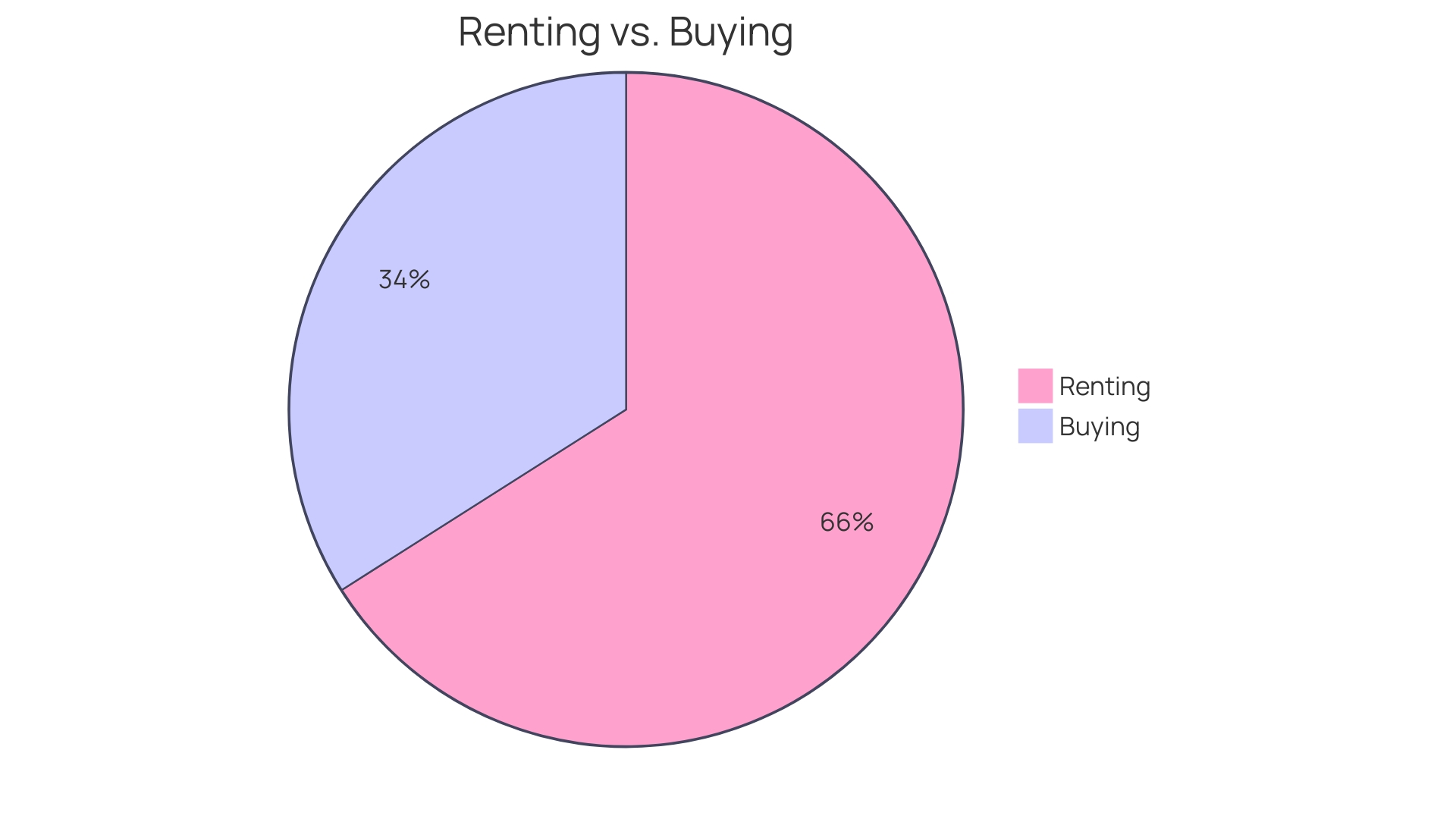
Versatility and Range of Attachments
Compact machines stand as a testament to the power of versatility in construction equipment. These nimble machines are not just for digging; they can adapt to a multitude of tasks thanks to a broad array of available attachments. Need to trench through stubborn soil? Outfit your digging machine with a sturdy bucket. If breaking through concrete is the task at hand, a hydraulic hammer attachment makes it manageable. Grapples are perfect for clearing debris, while augers can drill into the earth with precision. When compaction is required, switch to a compactor attachment. The versatility provided by these attachments can result in substantial time savings on the worksite, as a single compact construction vehicle can seamlessly switch between functions, streamlining operations and potentially decreasing the requirement for multiple specialized machines.
Compact Size and Maneuverability
Compact excavators have become a cornerstone in urban and confined space construction due to their small footprint and agile maneuverability. These agile machines are engineered to perform with precision in confined spaces where conventional, larger machinery simply can't fit. The ability to effortlessly traverse narrow paths, slip through gates, or enter doorways makes them indispensable on job sites with spatial limitations. Their versatility shines in a variety of settings from intricate landscaping projects to compact construction zones and residential work areas. The recent integration of the E10e Electric Excavator in the historical Complesso Monumentale dei Girolamini in Naples showcases the machine's potential to operate in sensitive environments, uncovering treasures of the past with minimal disruption. As rental companies like Lensrentals demonstrate with their vast, diverse inventory, the demand for temporary, high-quality equipment solutions is at an all-time high. This is reflected by the industry's shift towards sustainable practices, with JCB's dedication to fuel-efficient engines and exploration of hydrogen combustion technology, guaranteeing that compact construction machinery are not only versatile but also environmentally conscious choices for today's construction requirements.
Efficiency and Cost Savings
The landscape of construction sites is evolving with technological advancements, just as it has in other industries. The incorporation of highly efficient and versatile equipment like compact diggers is a prime illustration of this evolution. Not only a basic digging instrument, these earthmovers now arrive furnished with cutting-edge functionalities like self-governing 3D mapping and accurate stone positioning abilities, as showcased in research initiatives by organizations such as Gramazio Kohler Research and the National Center of Competence in Research for Digital Fabrication. Their sophisticated tools and algorithms enable them to perform tasks autonomously, which were previously impossible without human intervention.
In practical terms, small diggers offer multiple advantages, such as precision in tight spaces and reduced fuel consumption compared to their larger counterparts. They are a cost-effective solution for construction managers dealing with budget constraints, as they eliminate the need for multiple machines on-site. With the ability to perform detailed grading and digging, construction teams can minimize the risk of damage to nearby structures and reduce manual labor expenses.
Moreover, the adaptability of these machines reflects the broader trend of automation in various sectors. For example, Magic Valley Produce, a leader in the potato supply chain, overcame labor shortages by leveraging automated systems to handle heavy lifting tasks in limited spaces. Likewise, building endeavors gain advantages from the capacity of small diggers to manage diverse assignments that would otherwise necessitate distinct kinds of machinery, improving overall efficiency.
The rental market for construction machinery is also expanding, as evidenced by Lensrentals' acquisition of BorrowLenses, signifying a growing demand for flexible, high-quality machinery solutions. While aiming to enhance efficiency and adhere to budget constraints, construction managers find that opting for the rental of smaller digging equipment is a tactical decision. It aligns with the industry's shift towards more flexible, cost-effective, and advanced equipment solutions, allowing for timely completion with reduced labor costs and increased productivity.
Factors Affecting Rental Costs
The cost of renting excavators can vary widely depending on several factors that you need to take into account to find the most economical solution for your project. Equipment type, size, and features are main factors in determining prices for hiring. For example, while innovation shifts towards more fuel-efficient and environment-friendly machines, such as JCB's emphasis on hydrogen combustion engines, the costs of leasing may mirror the advanced technology and related advantages.
Rental duration is another key factor. Short-term accommodations might come at a higher daily rate compared to long-term arrangements. Businesses such as URI showcase the strategic approach behind this pricing framework, with their machinery typically generating approximately half of its initial cost in income annually throughout a seven-year usage period.
Location also plays a crucial role. The Southern United States, for instance, is renowned for providing roomy choices at competitive prices, which could result in more budget-friendly solutions for heavy machinery.
Finally, market trends indicate a shift towards more cost-conscious and sustainable practices, as seen in the recent surge of leasing businesses. This has been driven by the dual appeal of financial savings and practicality, indicating that renting, instead of buying, is becoming an increasingly appealing option for managers aiming to maintain budget discipline while meeting their equipment needs.
By taking into account these factors, you can make a well-informed choice on leasing a digger that guarantees cost-effectiveness and is in line with the most recent advancements in the industry and sustainability efforts.
Equipment Size and Specifications
Selecting the suitable compact machinery is crucial for the financial aspect of your undertaking. Choose a smaller digger with only the necessary characteristics, and you'll discover the cost of leasing to be more economical. Nevertheless, in the event that the extent of your undertaking requires a bigger excavator with more noteworthy force and extra abilities, be ready for an augmented cost of renting. It's a balance between project requirements and cost efficiency; selecting a machine that aligns with your project's scale not only ensures operational effectiveness but also aids in controlling expenditures. Remember, the goal is to get the job done effectively while keeping an eye on the budget.
Rental Duration
Understanding the dynamics of costs for those looking to make an economical choice is crucial. It's a typical trend in the leasing sector that agreeing to a lengthier-term lease frequently leads to more advantageous daily or weekly rates. This is especially important for compact excavators, where prolonged undertakings can access these savings. Proactive negotiation with your rental provider, armed with knowledge of your project timeline, can unlock cost efficiencies. For instance, evidence from the Complaints Committee for the purchase of goods and services showcases the importance of clear agreements and understanding potential financial liabilities or savings. Moreover, the data-driven approach discussed in industry analysis highlights the value of these negotiations. By clearly communicating your usage plans and leveraging usage data, you may secure better terms that reflect the duration and intensity of device use. This approach not only maximizes your budget but also ensures that you are not penalized for the natural wear and tear on rented machinery over time. In the context of the businesses surge, as reported by industry experts, the trend towards renting for cost-efficiency and practicality is clear. The model for leasing, as shown by URI's buyback history, also demonstrates the potential for significant revenue generated from renting equipment over its usable life. This understanding can empower you to make informed decisions about durations and negotiate terms that align with your financial goals.
Additional Attachments
When choosing options for hiring an excavator, it's important to consider the additional costs of specific attachments that your project may need. Attachments such as hydraulic hammers or augers can greatly affect the overall cost of leasing. The availability and pricing structure for these add-ons vary, and it's crucial to have a discussion with the company providing the service to get a clear understanding of these costs. The market for renting can change depending on various factors, including the type and quality of gear you're seeking, the duration of the lease, and your geographical location. For example, Mansur's insights indicate that the cost of borrowing a basic power tool may range from around $30 to $50 per day. This price can escalate for larger or more specialized equipment, but it remains a cost-effective alternative to purchasing outright, especially for short-term needs. As you navigate the lease landscape, bear in mind that prices are not universally consistent, even within the same rental chain, so always confirm the rates at your local branch. Moreover, with the construction industry poised for growth, as indicated by Glenigan's UK Construction Industry Forecast for the upcoming years, it's imperative to make informed financial decisions that align with these market trends.
Delivery and Transportation
When contemplating the hiring of a compact excavator, logistics play a vital role in the overall cost. The closeness of the facility to your project site can greatly impact the overall cost. It's not uncommon for companies that offer leases to provide delivery services, yet some may require clients to handle the transport themselves. For instance, sustainable practices in the construction industry, such as the use of fuel-efficient engines and the exploration of HVO (Hydrotreated Vegetable Oil) as a safer, more eco-friendly alternative, have become increasingly important. This focus on sustainability can also impact transportation choices, as companies may consider the environmental footprint of delivery options.
Furthermore, recent industry trends highlight a shift towards electric heavy machinery, championed by companies like Lonking and Hevi, which are dedicated to quality and environmental responsibility. As the industry progresses, so does the significance of integrating these considerations into the decision-making process for leasing and logistics of transportation.
When planning for construction equipment, it is crucial to take into account not only environmental factors but also the operational costs, such as fuel, maintenance, and insurance. Financial forecasting and risk management play pivotal roles in preparing for unforeseen expenses such as vehicle breakdowns or changes in fuel prices. By being aware of these factors and planning accordingly, construction project managers can ensure they make cost-effective decisions that align with their project requirements and sustainability goals.
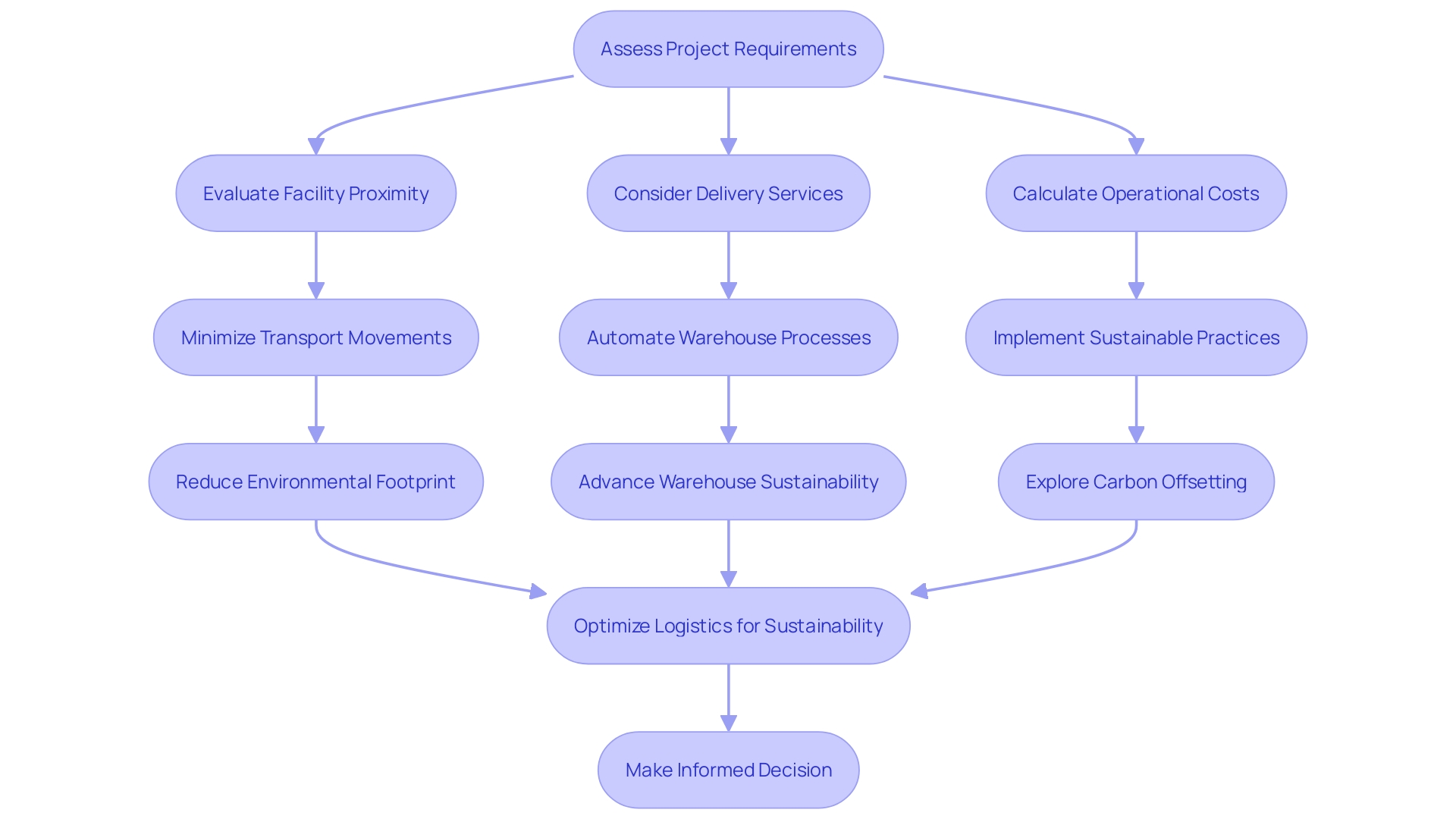
How to Rent a Compact Excavator Near You
Securing a compact excavator rental near your location can be efficient and hassle-free when you understand the process and your options. Innovative platforms streamline the selection and booking of machinery, where you can submit a service request through an app and receive immediate responses from available technicians. These platforms not only offer convenience but also the opportunity to choose the professional you feel is most suitable for your project needs.
One of the main benefits of utilizing such services is the availability of a variety of device choices, including those that are leading the path towards a net-zero carbon footprint, like JCB's hydrogen combustion engines. This dedication to innovation ensures you're leasing the latest in machinery technology, while also supporting environmentally responsible practices.
When taking into account the costs, expenses for borrowing tools can differ, with factors such as the kind of machinery, its quality, borrowing duration, and local market choices influencing the situation. For example, hiring a basic power tool might require you to pay around $30 to $50 per day, but bigger machinery will naturally come at a higher cost. Despite this, renting remains a cost-effective alternative to purchasing, particularly for one-time or infrequent use.
Independent hardware stores and dedicated rental companies often provide a more personalized service, with knowledgeable staff and convenient services like delivery and collection. Local stores might have a smaller selection, but they can be a good choice for customer service and expertise.
The modern construction landscape demands versatility and efficiency, which telescopic handlers deliver by combining multiple functions into one machine. They can decrease expenses and save time on-site by performing tasks that would otherwise necessitate multiple distinct pieces of machinery.
As the construction industry evolves, staying informed about market conditions and leveraging financing opportunities can be crucial. The Leasing and Finance Association (ELFA) is a valuable resource, representing the $1 trillion finance sector and providing information to help companies navigate these dynamic times.
In summary, the process of renting small digging machines and other equipment near you has become more user-friendly and cost-effective, thanks to technological advances and dedicated services. With a better understanding of the options and costs, you can make informed decisions that align with your undertaking requirements and budget constraints.
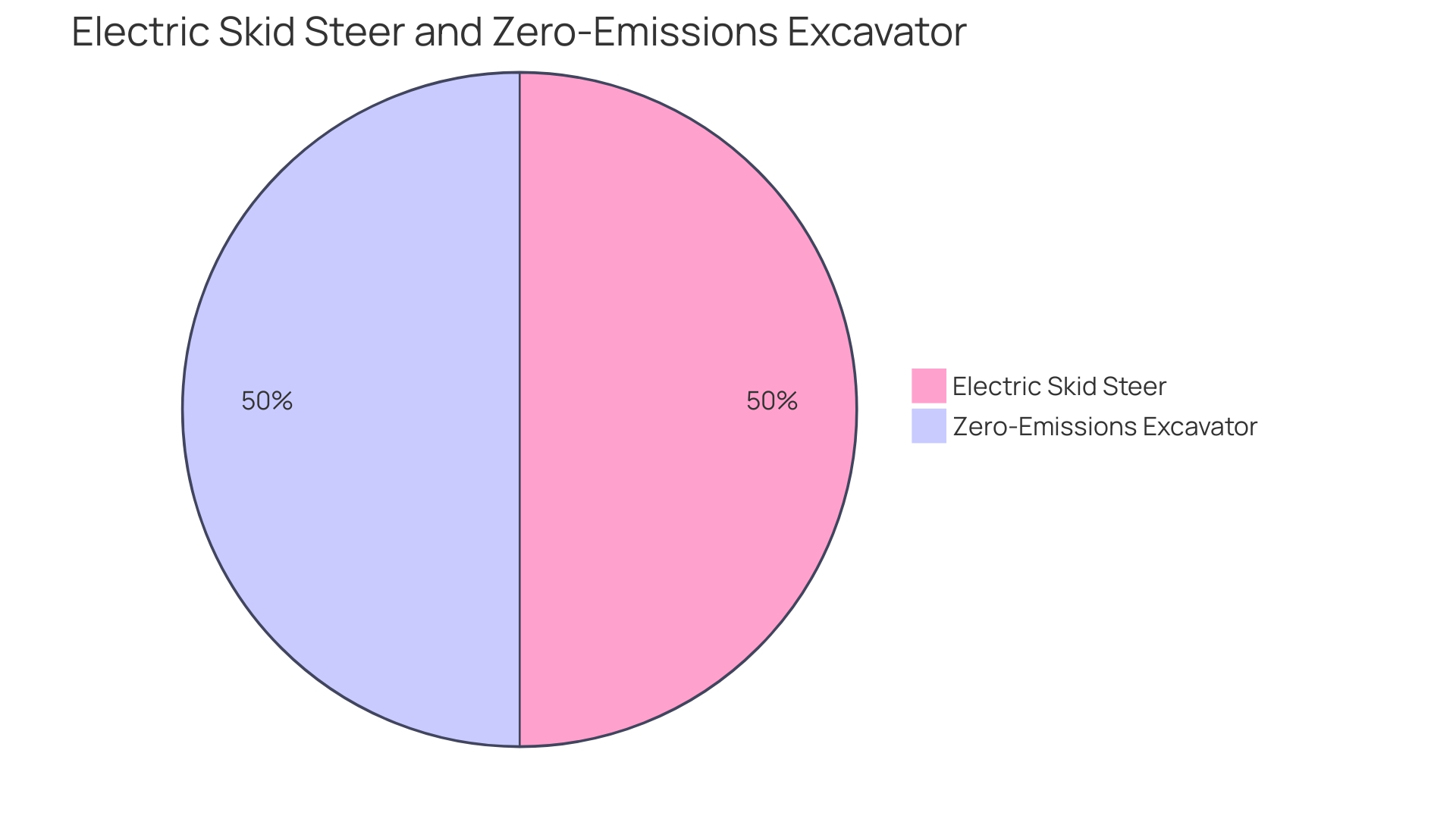
Assess Your Project Needs
Choosing the appropriate machinery for your construction endeavor is vital for both operational effectiveness and cost-efficiency. It's important to consider the specific demands of your project – whether that's the delicate task of unearthing historical treasures beneath an ancient complex, as seen in the excavation work at the Complesso Monumentale dei Girolamini in Naples, or utilizing advanced technology like the E10e Electric Excavator for sustainable and precise operations. The dimensions of the digging machine should correspond to the magnitude of your assignments; excessively big, and it might be unwieldy in confined areas, excessively small, and it might lack the essential force. Furthermore, with the construction industry facing a surge in demand and the pressing need to reduce its ecological footprint, employing fuel-efficient, low-emission machines like those powered by HVO (Hydrotreated Vegetable Oil) can contribute to more sustainable practices. This not only helps in achieving environmental goals but also addresses global challenges such as climate change. Moreover, leveraging versatile machinery like telescopic handlers that offer a range of functions from lifting to transporting materials can streamline operations, enhance productivity, and minimize the need for multiple pieces of equipment on-site. With the advancement of digital technologies, the consideration of self-directed or partially self-directed digging machines equipped with sensors and machine vision can enhance workflow efficiency and enhance safety at construction sites. In the end, a careful evaluation of your endeavor's extent and the inventive alternatives accessible can result in substantial time and cost reductions, while also supporting the longevity of your construction methods.
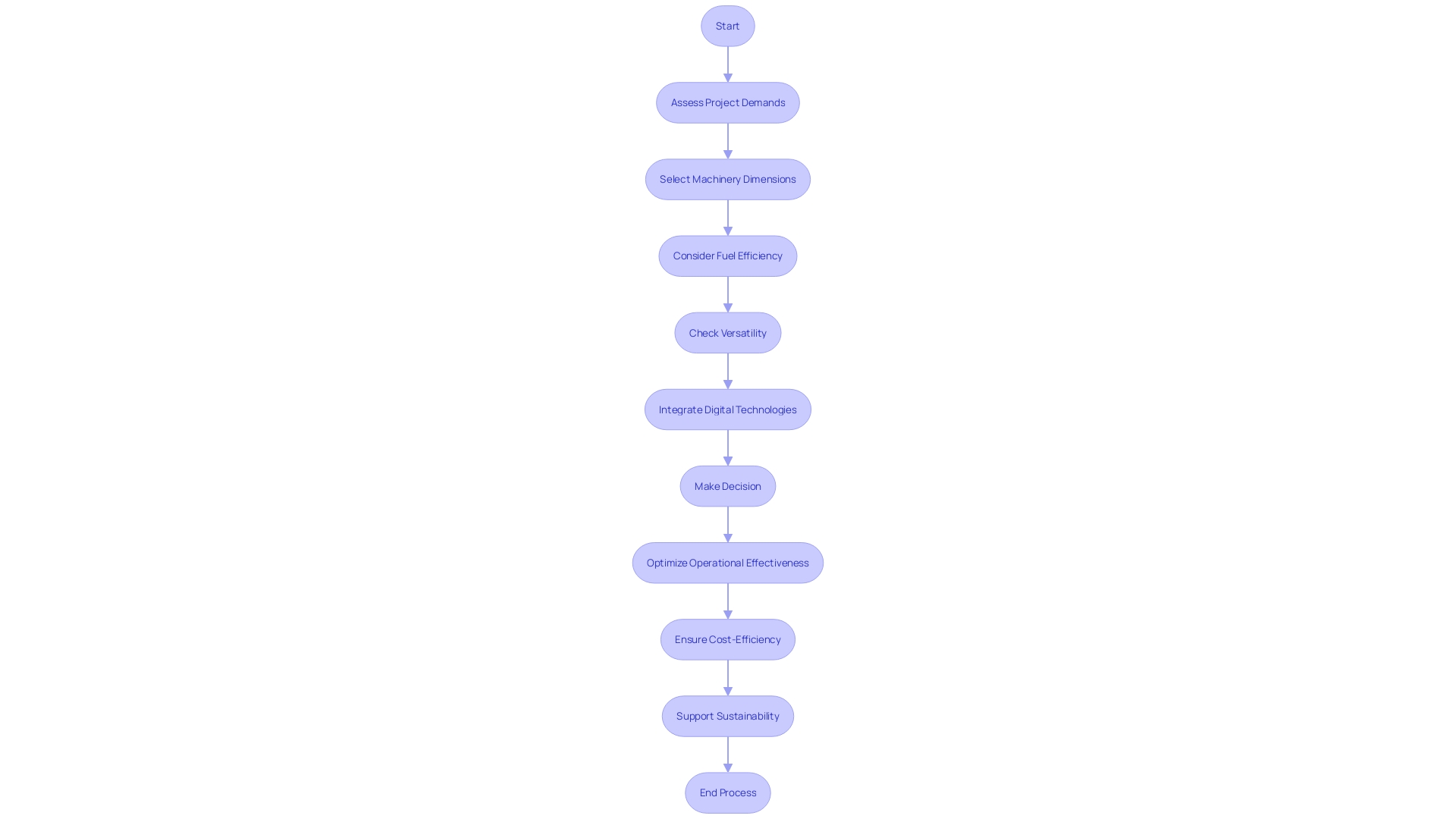
Research Rental Companies
When looking for options for a small digging machine, a strategic method of finding the appropriate supplier is crucial. Well-known local leasing firms often have a varied range of machinery, guaranteeing you have access to the particular kind of excavator that fulfills your project's requirements. Prioritize establishments that are not only reputable but also boast a wealth of positive customer testimonials. These endorsements serve as a testament to the company's reliability and quality of service.
It's notable that companies that focus on the finer details, such as Roam Rental Co.'s thorough pre-planning for large-scale events, often deliver superior service. They take into account all aspects that affect user experience, a philosophy that's equally important when selecting excavation equipment. The comfort and ease of operation can significantly impact productivity on site.
In the domain of leasing, current market trends emphasize the significance of cost-effectiveness. As mentioned by industry insights, the market for renting has grown, driven by consumers seeking practical and financially prudent solutions. This shift is apparent in the construction sector as well, where the versatility and cost-effectiveness of leased equipment, like telescopic handlers, underscore the benefits of choosing the right rental associate.
Moreover, with rates for renting increasing, it's essential to make sure that your investment produces the desired utility without exceeding your budget. Based on the analysis of ATTOM's CEO, Rob Barber, the present economic situation indicates that leasing might present a more viable alternative than acquisitions, as salaries are increasing at a faster rate than residential property costs in a substantial part of the country. This economic context emphasizes the necessity for construction managers to carefully choose their leasing choices, maintaining a balance between the price and the excellence of equipment.
Therefore, when investigating local companies that offer compact earth-moving machines, take into account the variety of their inventory, customer contentment scores, and the nuanced benefits they provide for your particular project needs. By doing so, you ensure that your choice is not only a match for your immediate needs but also a sound economic decision in the broader context of the evolving leasing market.
Request Quotes and Compare
To secure the best deal on excavator leasing, a shrewd approach is essential. Start by surveying a variety of companies that offer rentals, acquiring comprehensive quotes that correspond to the specific needs of your construction endeavor. Carefully examine each offer, taking into account not only the price, but also the conditions for renting and the presence of the necessary types of apparatus. By meticulously comparing these factors, you'll be well-equipped to make a choice that guarantees value for money while meeting your project's deadlines and quality expectations.
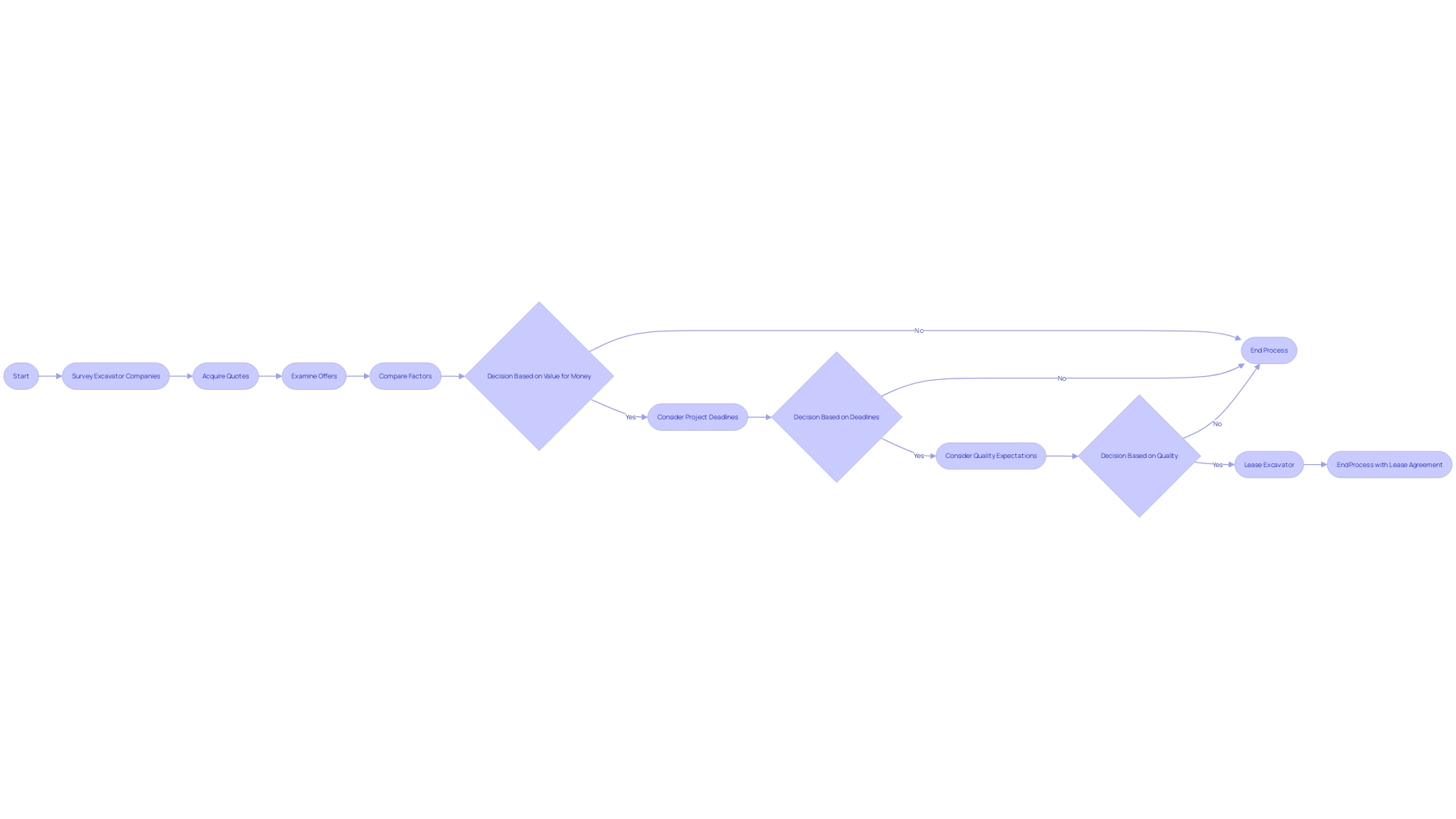
Check Rental Policies and Agreements
When preparing to lease excavation equipment, it's crucial to thoroughly examine the agreement before signing. This agreement specifies important terms like insurance coverage, liabilities, and any possible additional expenses that may occur throughout the duration of the lease. For example, a decision by the Complaints Committee for the acquisition of products and services emphasized that a lessee should not bear the responsibility of enhancing the condition of the vehicle beyond its state at the time of leasing. Such precedents emphasize the importance of understanding financial responsibilities, especially in situations where a dispute may occur.
Furthermore, with industry leaders such as Boels Rental Group providing a wide array of equipment throughout Europe, and the market experiencing considerable expansion driven by economic and practical advantages, it's clear that the sector for leasing fills a noteworthy market void. Renters can save considerable costs by avoiding outright purchases for temporary needs. Nevertheless, with the thriving of businesses that offer rentals, it is increasingly crucial to have a good understanding of the terms in contracts for renting. This knowledge not only safeguards against unexpected financial loss, as demonstrated in the case where the appeal committee ruled against a defendant's unproven financial claims but also ensures a clear understanding of the renter's obligations.
Considering the available options, take the time to thoroughly review the contract in light of this. Ensure clarity on terms like lease duration, security deposits, grace periods, and procedures for potential eviction. Doing so will help you make a well-informed decision, leveraging the cost-efficiency and practicality of renting while staying protected against any misunderstandings or disputes.

Arrange Delivery or Pick-Up
To efficiently secure a compact excavator rental, it's essential to communicate effectively with the rental company. This involves giving them accurate information such as the precise location of your task and the duration you require the equipment. For instance, in the case of large projects, like those undertaken by St. James Winery, which has a reputation built over 50 years for excellence, attention to detail in planning can make all the difference. Similarly, when tech giant Amazon expanded its operations, meticulous coordination was key in integrating new drone delivery systems into their network, demonstrating the importance of detailed planning and communication.
When considering costs associated with renting, it's important to note that these can vary based on several factors. Based on industry insights, the average price for hiring a basic power tool could vary between $30 and $50 per day, with prices changing depending on the type of tool and duration of hire. This aligns with the equipment financing sector's observations, where annual revenue per machine is approximately half of its original purchase price, and companies can rent out the equipment for an average of seven years.
Furthermore, revolutionary leasing alternatives like Turo and Kyte have revolutionized the customary process, providing adaptable pick-up and delivery choices that accommodate the customer's convenience. For example, Kyte offers competitive pricing and will deliver and pick up vehicles at the customer's specified location without additional fees. This demonstrates a developing leasing environment that emphasizes customer service and efficiency, a sentiment echoed by the Equipment Leasing and Finance Association, which underscores the value of utilizing financing to empower businesses.
As the equipment finance industry evolves and the economic landscape remains volatile, with factors such as global slowdowns and geopolitical tensions affecting markets, strategic partnerships with leading companies that emphasize customer-centric approaches can be a significant advantage. The emphasis on collaborative relationships, as noted by experts in the field, can lead to alternative strategies and innovative solutions that enhance the rental experience and contribute to the successful completion of projects.
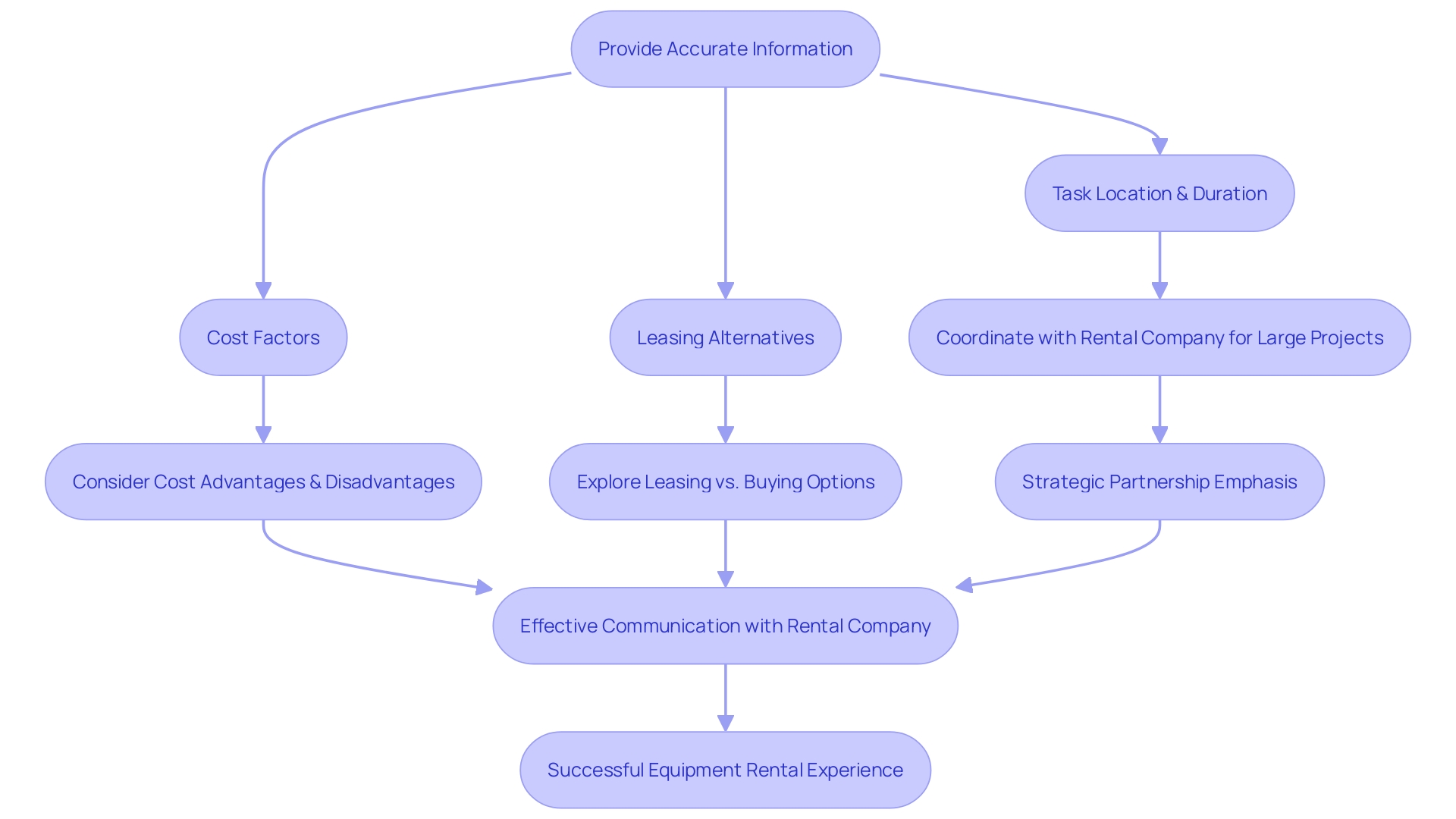
Familiarize Yourself with the Machine
Upon receiving your compact excavator, it's essential to become well-acquainted with its functionalities and safety protocols. This is not just a matter of operational efficiency but also of safety and precision. As demonstrated by a recent case where Lucci Salvatore Srl utilized an E10e Electric Excavator to uncover historical treasures in Naples, the proper understanding of machinery can result in fruitful and unforeseen results. Therefore, ensure you thoroughly review the operator's manual and, if available, take advantage of a hands-on demonstration offered by the rental company. This will provide you with the essential abilities to safely and efficiently handle the digging machine, just like operators must undergo training and certification to operate equipment such as overhead cranes, as emphasized by industry expert Hannah Boothe. Comprehending the controls and capabilities of your digging machine is similar to the meticulous approach taken by companies like Parker, which design solutions for complex engineering challenges. Sufficient preparation and knowledge can result in smooth execution and, potentially, the discovery of unforeseen advantages during the excavation process.
Conduct Regular Maintenance and Inspections
Regularly scheduled maintenance is crucial for operational excellence, guaranteeing that rental machinery such as excavators operates dependably throughout your endeavor. A study by Sapio Research underscores this, revealing that 92% of plant maintenance decision-makers reported increased uptime due to diligent maintenance, with 38% noting at least a 25% improvement. This not only strengthens the performance of the machinery but also enhances your company's reputation and financial health.
Drawing inspiration from influential figures such as Sulzer, who streamlined the management of a French power plant overhaul by consolidating services, maintaining a centralized point of contact for servicing can optimize workflows and lead to financial benefits. Similarly, Atlas Copco's I-Rent platform offers real-time tracking, enabling you to monitor running hours and fuel consumption, thereby empowering you to address issues promptly and efficiently.
Case in point, when a civil and military aviation company faced a compressor breakdown, Atlas Copco Rental's swift response with an electric driven oil-free air solution minimized downtime. This kind of reactive maintenance is essential, but it's proactive checks that often prevent such emergencies.
Furthermore, as the Equipment Leasing and Finance Association suggests, staying ahead of economic volatility through capital investments in reliable equipment is vital. This aligns with the 60% of companies planning to increase investment in maintenance and reliability over the next three years, with a third of those aiming to boost spending by over 10%.
In essence, adhering to the rental company's maintenance guidelines is more than a good practice—it's a strategic imperative that echoes across industries, from aviation to energy generation, and it's a critical component of successful project management.
Conclusion
In conclusion, choosing a compact excavator rental for your construction project offers numerous benefits. Recent advancements in construction machinery technology highlight the importance of innovative solutions and collaborative efforts in project execution.
Autonomous excavators and telescopic handlers exemplify the cutting-edge capabilities available in today's market. Compact excavator rentals address challenges such as labor productivity and environmental impact, making them a smart choice for environmentally-conscious project managers.
The versatility of compact excavators allows them to adapt to various tasks and navigate confined spaces. They offer efficiency and cost savings by providing precision in tight spaces and reducing fuel consumption. Renting compact excavators aligns with the industry's shift towards more flexible, cost-effective, and advanced equipment solutions.
Assessing your project's needs, researching rental companies, and understanding rental policies are essential steps to make an informed decision. Familiarizing yourself with the machine's functionalities and conducting regular maintenance and inspections ensure safe and efficient operation.
By selecting the right compact excavator rental, project managers can achieve operational efficiency, cost savings, and contribute to sustainable construction practices. These rentals offer a reliable and convenient solution for construction projects, providing the necessary capabilities to complete tasks effectively and efficiently.




